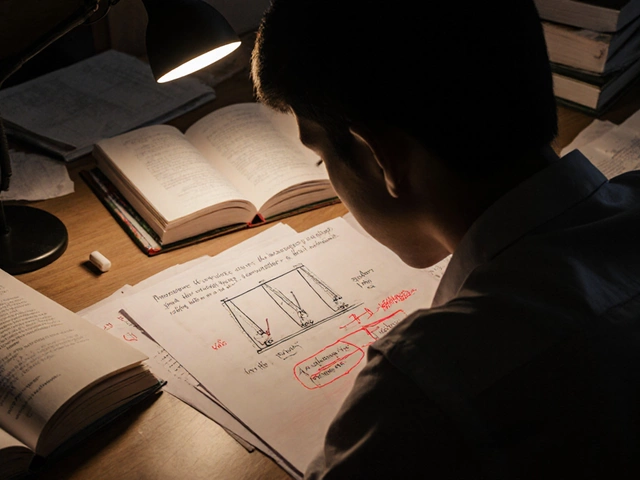Diving into the world of competitive exams is not for the faint-hearted. These tests often signify the gatekeepers to prestigious schools, coveted jobs, and life-changing opportunities, and they demand relentless dedication and preparation. Among the myriad subjects students may face, some stand out as particularly daunting. These aren't just tests of memory or basic comprehension, but rather arenas where understanding, application, and critical thinking are put to the ultimate test.
What makes certain subjects notoriously hard? Is it the vastness of content, the depth of understanding required, or the abstract nature of some topics? Every student might have a different battle, but common threads often tie the toughest subjects together. Join us as we dissect these academic giants, uncovering not only their challenges but also highlighting strategies that can make tackling them a more manageable, rewarding endeavor.
- Understanding Competitive Exams
- Subjects Known for Their Difficulty
- The Science Behind Learning Tough Subjects
- Proven Study Techniques
- Balancing Theory and Practice
- Resources and Support Systems
Understanding Competitive Exams
Competitive exams have long been a fundamental element of academic and professional advancement. They originated as early as the civil service examinations in ancient China, demonstrating their historic importance as a means to select individuals for specific roles based on merit rather than privilege. In our fast-paced world, these exams serve as an essential tool for those who want to pursue higher education, career advancements, or specialized fields. Such tests measure an individual's comprehensive understanding and capability in a given domain, from math and science to law and languages.
The nature of competitive exams is rigorous by design. They often cover vast syllabi, expecting candidates not only to memorize information but to integrate and apply it creatively to solve complex problems. For instance, exams like the GRE, GMAT, and LSAT do not merely assess rote learning but are crafted to evaluate analytical thinking, problem-solving abilities, and logical reasoning. Test makers aim to identify those who possess deep understanding and intellectual savvy, making these exams notoriously challenging.
The stress and pressure associated with these exams can be immense. It's reported that about 60% of competitive exam takers experience high levels of anxiety, which can impact performance. However, many embrace this challenge with the understanding that success can lead to transformative life changes. As Richard Feynman, renowned physicist and Nobel laureate, famously said:
"The reward for work well done is the opportunity to do more."This mindset drives countless students and professionals to dedicate significant effort towards mastering these daunting exams.
Preparation for competitive exams is where the real work begins. This involves not only thorough knowledge of the subject matter but also an adeptness at taking tests, which has become an art in itself. Most successful candidates go beyond just studying content; they familiarize themselves with the exam structure, develop time management skills, and practice under test conditions to improve their stamina and pace. These exams are not just a test of knowledge, but a measurement of endurance and focus.
Interestingly, the educational landscape for competitive exams is constantly evolving. With technological advancements, resources are more accessible than ever, providing candidates with web-based tools, online coaching, and diverse content formats catering to different learning preferences. Notably, some of the world's most prominent universities now offer extensive free online courses that give learners a headstart in comprehending difficult subjects. This democratization of education makes it possible for anyone, irrespective of location or socio-economic status, to prepare effectively for even the toughest exams.
The importance of understanding the scope and demand of competitive exams cannot be underestimated. As individuals embark on this journey, it's crucial they form a structured study plan, understand their personal learning styles, and remain informed about resources that best suit their preparation needs. Armed with the right tools and mindset, students and professionals alike can not only tackle challenging subjects but excel in them, opening doors to a myriad of opportunities.
Subjects Known for Their Difficulty
The landscape of competitive exams is dotted with subjects that compel students to stretch the limits of their intellectual endurance. Among these, mathematics is often perceived as a towering challenge. But it's not just about crunching numbers; it's a rigorous exercise in logic, abstract thinking, and problem-solving. At higher levels, it demands an ability to navigate the fine line between theoretical concepts and their practical applications in real-world scenarios. This complexity requires not only a deep understanding but also a multifaceted approach to problem-solving.
Physics, another formidable subject, offers a universe of challenges that can feel as daunting as the cosmos it explores. With myriad concepts ranging from quantum physics to classical mechanics, it demands a robust grasp of theoretical principles and a knack for applying these principles to solve complex problems. Many students find this dual demand overwhelming. Moreover, the rapid pace of developments in physics means that staying current with knowledge is paramount, adding yet another layer to the complex tapestry of learning and excelling in this field.
"Physics is imagination constrained by mathematics," says Dr. Brian Greene, a renowned theoretical physicist, encapsulating the balance one must strike to master physics.
The realm of law also poses significant hurdles, though of a different kind. Unlike STEM subjects that require numerical precision or experimental insight, law demands an ability to interpret texts, while juggling historical precedents and evolving societal norms. The challenge here lies in mastering volumes of legal statutes, case laws, and doctrines, all of which require not just rote memorization but analytical prowess. Aspiring lawyers must develop the skill to sift through vast amounts of complex information to construct cogent arguments and make sound judgments. The task becomes more daunting when one considers the nuanced language and the intrinsic logic that the legal field demands. These complexities often lead to a notorious reputation for being among the hardest subjects in the domain of competitive exams.
The intersection of computer science and technology in these exams adds another dimension of difficulty. As technology evolves at a breakneck speed, so too does the knowledge needed to excel in this domain. Students face the constant challenge of keeping up-to-date with software technologies and coding paradigms, which often requires a substantial investment of time and energy. The expectation to innovate does not just sit at the practitioner level but moves through to the realm of academia and testing, making it equally demanding as more traditional fields.
To illustrate just how daunting these subjects can be, a survey conducted by the Educational Testing Service revealed that among students preparing for competitive exams, those focusing on mathematics, physics, and law often report higher levels of stress and longer study hours compared to peers in different fields. These statistics are a testament to the rigorous demands placed by these especially challenging subjects. For many students, mastering them requires an exceptionally disciplined approach, guided by strategic planning and efficient time management.

The Science Behind Learning Tough Subjects
Understanding the complexity of hardest subjects largely depends on the way our brains are wired to process and store information. Science tells us that every piece of knowledge we acquire forms networks of neurons in the brain. The densest, most connected webs of these neural paths are often found in areas of expertise. Creating and strengthening these networks is no small feat when it comes to challenging subjects like theoretical mathematics or advanced physics. These subjects test not just memory, but also deep comprehension and the ability to abstract ideas into real-world applications. For many students, the hurdle lies in transitioning from passive learning to active engagement with the material, which demands both patience and creativity.
Moreover, cognitive load, which refers to the amount of mental effort being used in the working memory, plays a significant role. When studying complex topics, more cognitive resources are required, taxing what our brains can comfortably handle. A strategic approach can be incredibly helpful here. Breaking down intricate concepts into manageable segments and building upon them slowly has been shown to mitigate cognitive overload. Educational psychologist John Sweller developed this theory, emphasizing the importance of structured learning environments where complexity is introduced gradually.
"The best results come from students who are not only engaged in repeated, varied practice but who also make errors in the process." - John Sweller
Research highlights that one effective strategy in mastering difficult subjects is the spaced repetition technique. Spaced repetition leverages the psychological spacing effect, where information is learned more effectively when study sessions are spaced out over time. This can be particularly useful for subjects under the competitive exams category like biology or chemistry, which require memorization of huge amounts of details. By revisiting topics at strategically spaced intervals, students strengthen their memory retention capabilities.
Interestingly, motivation and emotional factors can also impact learning. A positive mindset can enhance cognitive function, making it easier to tackle the daunting tasks that come with these tough subjects. This is where interest-driven learning comes into play. When individuals are genuinely interested in what they study, they are more inclined to delve deeper, transforming daunting subjects into intriguing puzzles waiting to be solved. Encouraging curiosity and autonomy in learning can lead to better outcomes because students naturally allocate more effort to subjects they're passionate about.
Proven Study Techniques
Tackling competitive exams often requires more than mere textbook study. It demands an understanding of learning as both an art and a science. Developing techniques that hone focus, enhance retention, and deepen comprehension is crucial. It’s not about clocking long hours alone, but making those hours count. One proven strategy is active learning—engaging with the material actively rather than passively reading texts or notes. Techniques such as summarizing information in your own words, teaching concepts to someone else, or even discussing ideas in study groups can drastically improve understanding and memory.
A powerhouse in the arsenal of study techniques is the practice of spaced repetition. This technique takes advantage of the brain's preference for periodic exposure to information over cramming. By spacing out review sessions over increasing intervals, students can strengthen their memory retention dramatically. A popular tool that implements this method is the flashcard app Anki, which utilizes algorithms to optimize the timing of reviews for individual cards. This method is crucial for subjects like mathematics and physics that require long-term retention of complex concepts.
Another key technique involves interleaved practice, which mixes different types of problems or subjects into a single study session. This method has been shown to enhance learning by promoting the brain's ability to differentiate between concepts and identify the optimal strategies for solving diverse problems. Studies show that students who practiced with interleaved problems solved new problems more effectively than those who practiced in blocks. The use of mock tests cannot be overstated—they simulate exam conditions, provide insights into timing management, and reduce test-day anxiety.
"The biggest enemy of success is the fear of failure, but the fear of failure is what drives learning," Scott Galloway emphasized, highlighting the importance of persistence in learning challenging subjects.
For competitive exams, managing one's time and energy is paramount. Prioritize the more challenging parts of the syllabus when your mind is sharpest, often early in the day or after a restful break. Employ techniques like the Pomodoro Technique, where focused study blocks of 25 minutes are punctuated by short breaks, helping maintain peak mental performance and stave off burnout. Incorporating visual aids such as mind maps and diagrams makes abstract concepts more tangible, allowing for easier recall during exams.
The power of visualization shouldn't be disregarded. Visualize yourself solving problems, mastering concepts, and achieving your goals. This mental rehearsal primes your brain for success and builds confidence. Seek feedback regularly to identify and rectify weaknesses in understanding. Resources like Khan Academy, Coursera, and local tutors can provide the balanced support and instruction necessary for such rigorous preparation.

Balancing Theory and Practice
For students preparing for competitive exams, mastering both the theoretical and practical aspects of a subject is crucial. Often, the toughest hurdle is not the understanding of complex theories but marrying those abstract concepts with their practical applications. Take mathematics, for instance: it isn't enough to memorize formulas; one must understand how to apply them to solve real-world problems. This duality can be daunting, yet it is this very integration that distinguishes mere rote learning from genuine comprehension.
Consider the field of physics, where theory meets practice head-on with palpable impact. Theories in physics explain phenomena, but practical insights help you grasp the tangible effects of laws in motion. When Isaac Newton first penned his laws of motion, he didn’t just theorize the concept of inertia; the understanding of how it applied to moving objects revolutionized science. Anecdotes like these illuminate the importance of practice in rendering theory meaningful and digestible. Applying theories through experiments or practical problems underscores the harmony between understanding a concept deeply and seeing it executed in real life.
One effective strategy is to engage with problems that demand a comprehensive application of both theoretical knowledge and practice-based scenarios. For instance, in engineering exams, students often face design problems where theoretical calculations must be underpinned by practical considerations like material strength and cost-effectiveness. This dynamic compels learners to constantly pivot between abstract thought and concrete application, a skill that is vital in various academic and professional fields.
According to a study from the Learning and Instruction journal, integrating theory and practice not only enhances the depth of knowledge but also boosts retention and boosts problem-solving abilities. The study found that when students actively participated in laboratory work following theoretical lessons, their test scores improved by an average of 15%. The hands-on experience not only solidified their understanding but also highlighted the importance of each theoretical component, giving context and immediate application.
"Tell me and I forget. Teach me and I remember. Involve me and I learn." - Benjamin Franklin
For subjects like law, where regulations and their ramifications form a critical part of competitive exams, practical case studies become a bridge between theoretical constructs and real-world implications. Case studies and moot courts, as practiced in many law schools, afford students the chance to dissect theoretical knowledge into actionable insights, illustrating how statutes play out in various scenarios. By engaging with cases, students visualize how abstract laws are validated in practical terms, which is paramount in refining their legal acumen.
Creating a balance, therefore, requires consciously integrating hands-on experience with textbook learning. Here’s a simple plan to ensure such a balance: plan your study sessions to include time for both theory and exercises. This could mean after studying a physics concept theoretically, heading straight to the lab to see it in action. Create a schedule where every theoretical hour is followed by an hour of practical application. Utilize online platforms that simulate practical scenarios, allowing you to test theories dynamically. Committing to this dual approach no doubt prepares students for the dual nature of exam preparation, setting a robust foundation for success in even the most challenging academic pursuits.
Resources and Support Systems
Diving into the arduous subjects of competitive exams takes more than sheer will—it requires a strategic use of resources and an effective support system. One of the first steps in harnessing these resources is identifying which materials align best with the syllabus and difficulty level of the exams. Online platforms like Coursera and Khan Academy offer a treasure trove of lectures and exercises tailored for these challenging subjects. They are particularly useful for visual and auditory learners who benefit from seeing concepts mapped out or explained in engaging video formats. With an overwhelming amount of available materials, it's crucial to frequently assess and adapt to ensure these resources continue to meet your evolving needs.
Formal education and professional tutors also play an instrumental role. A dedicated tutor or academic advisor can provide personalized feedback and strategies to address individual weaknesses, which is crucial for subjects like mathematics and physics that rely heavily on understanding underlying principles. Access to school libraries or public learning centers can supplement this process, offering quiet, resource-rich spaces perfect for deep study. It's also beneficial to engage in study groups, which can enhance learning through peer discussion and diverse problem-solving approaches.
Moreover, leveraging online forums such as Reddit or Stack Exchange provides the added advantage of connecting with a broader community of learners. Here, one can exchange tips, clarify doubts, and discuss complex topics. An often-overlooked aspect is the influence of a positive environment on study habits and stress reduction. As Michael Simmons, a well-known educational author, wisely stated,
"If you want to speed up your learning, surround yourself with peers who are more advanced and challenge you to keep up."
The role of technology cannot be overstated in creating effective exam preparation routines. Apps like Anki for spaced repetition flashcards harness cognitive science principles to enhance memory retention of critical information—especially useful in memorizing abstract and complex equations or legal principles. Exploring artificial intelligence tools that offer tailored quizzes and instant feedback also adds an essential layer of interaction absent in traditional textbooks. As independent study can sometimes become overwhelming, seeking guidance from mental health professionals or utilizing wellness apps ensures that the stress associated with preparing for competitive exams is not overlooked.
It's important to remember that resources extend beyond academic tools to include emotional and community support. Family and friends can act as additional motivators and stress relievers, creating a balanced lifestyle that supports intensive study periods. The synergy between these varied resources creates a robust scaffold that not only enhances learning capacity but also builds resilience and adaptability—key traits for navigating the often unpredictable nature of competitive exams.




